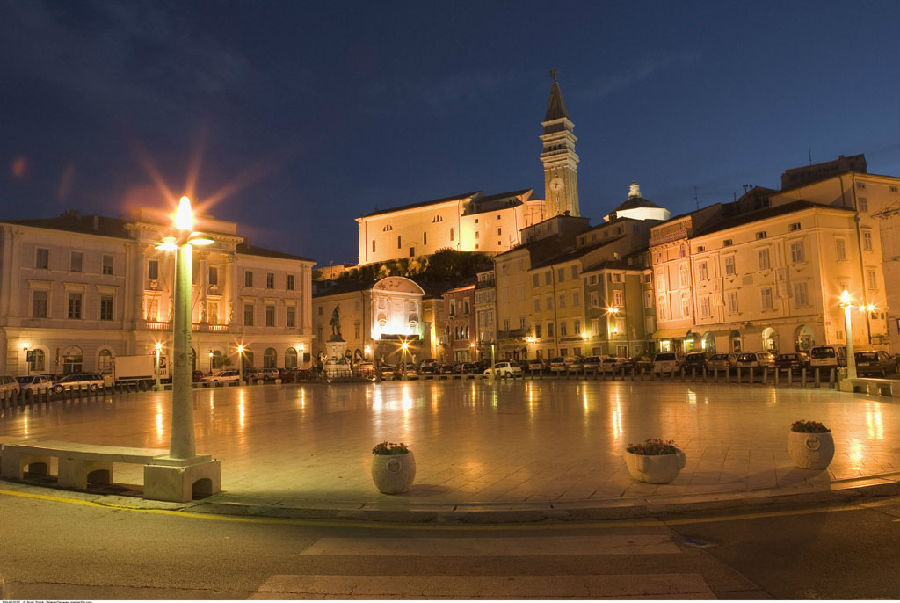斯洛文尼亞
Very European
濃郁的歐洲色彩
Slovenia’s first big crisis since independence
斯洛文尼亞獨(dú)立后首遇大危機(jī)
Beautiful but angry
美麗表面蘊(yùn)藏危機(jī)
Slovenes have always felt rather pleased with themselves. Their country is beautiful, they were the richest of the Yugoslavs and, after independence in 1991, they joined the European Union, NATO and the euro.
斯諾文尼亞的國民們一直生活得幸福快樂。他們的祖國景色秀麗,是前南斯拉夫中最富有的國家,并在1991獨(dú)立后加入北約,隨后成為歐盟成員國之一,并規(guī)定歐元為流通貨幣。
How different things are today. Slovenes are angry and confused. Their prime minister is on trial for corruption, unemployment is high, the country’s banks are teetering on the edge of bankruptcy and a series of painful structural reforms lie ahead.
然后三十年河?xùn)|,三十年河西。現(xiàn)如今,斯洛文尼亞舉國上下充滿著幽怨和迷茫。現(xiàn)任總理正因腐敗問題接受審訊,國內(nèi)失業(yè)率居高不下,該國的銀行在破產(chǎn)邊緣搖搖欲墜,而結(jié)構(gòu)改革的道路上有一系列的挑戰(zhàn)等待著他們。

In July Slovenia’s leading bank had to be bailed out to the tune of more than 380m ($478m) by the government. Janez Jansa, the prime minister, has talked of a “Greek scenario” and has warned that Slovenia will become the sixth European country to seek a bail-out unless his government’s reforms go through. The ratings agencies have downgraded Slovenia; many civil servants have had their pay cut by 7.5%.
在7月份的時(shí)候,斯洛文尼亞的主要銀行不得不接受超過38億歐元(約為47.8億美元)的政府援助來幫助自己脫離困境。現(xiàn)任總理Janez Jansa曾談?wù)摰揭粋€(gè)“希臘場景”,并警告說,如果斯洛文尼亞不進(jìn)行改革,它將成為第六個(gè)尋求援助的歐盟國家。而評級機(jī)構(gòu)已經(jīng)下調(diào)了斯洛文尼亞等級;許多公務(wù)員的工資也被削減了7.5%。
Even though Slovenia’s demography is terrible, it has until now had generous pensions and a low retirement age. As only 40,000 signatures are needed to call a referendum, painful reforms are easily blocked. A referendum that defeated an attempt at pension reform in June 2011 was the beginning of the end of the then government. The current coalition (in which a party of pensioners plays a crucial role) has adopted draft laws on pension and labour-law reform, which will both be contested.
盡管斯洛文尼亞人口老齡化情況是十分嚴(yán)峻的,到目前為止,全國還保持著高額的養(yǎng)老退休金以及低齡退休的傳統(tǒng)。由于全民公投需要40000人的簽名,因此曲折的改革之路很容易遇到阻礙。2011年6月的時(shí)候,一項(xiàng)全民公投將當(dāng)時(shí)被提出的養(yǎng)老金改革計(jì)劃扼殺在搖籃里,這意味著當(dāng)時(shí)政府失勢的開端。當(dāng)前的聯(lián)合政府(一群退休人員在這其中扮演著關(guān)鍵角色)通過了養(yǎng)老金和勞動(dòng)法改革的草案,這些都將會(huì)引發(fā)爭議。
Mr Jansa, a political veteran, came to power in February. He is on trial for allegedly taking bribes from a Finnish arms company. On September 5th the former head of one of Slovenia’s biggest companies was convicted of fraud. The Catholic church has been rocked by financial and sex scandals.
現(xiàn)任總理Jansa是一個(gè)政治老手,在今年2月上臺執(zhí)政。他在任期中因遭指控接受了一個(gè)芬蘭武器公司的賄賂,現(xiàn)正接受審理。9月5日,斯洛文尼亞頭號企業(yè)的前負(fù)責(zé)人被判欺詐罪。而天主教會(huì)一直也飽受金融和性丑聞的影響。
In this febrile atmosphere quarrels have been breaking out about who did what in the second world war. These altercations may serve as distractions from the country’s economic woes, but they provoke much bitterness. In the political mythology of Slovenia’s right the ten-day war of independence in 1991 should take centre stage, not the tragic events of 1945.
這焦躁不安的氣氛中,關(guān)于二戰(zhàn)某些人所作所為也是爭論不休。這些爭執(zhí)可能會(huì)分散他們對該國萎靡經(jīng)濟(jì)形勢的關(guān)注,但是另一方面也會(huì)引起他們的哀怨。占據(jù)在斯洛文尼亞政治神話的中央舞臺上應(yīng)該是1991為期十天獨(dú)立戰(zhàn)爭,而并非1945年的悲劇事件。
On November 11th Slovenia will go to the polls to elect a president. The incumbent, Danilo Turk, looks set for a second term. Under united leadership, Slovenia could recover relatively quickly, says Sonja Smuc, who runs an employers’ association. It has several companies that thrive abroad and its public debt, at 47.6% of GDP, is growing but far from critical. Renata Salecl, an intellectual, is less optimistic though. Many of Slovenia’s problems are similar to those elsewhere in Europe, she says, and “soon we will reach deadlock.”
11月11日,斯洛文尼亞將會(huì)全民投票選舉總統(tǒng)。現(xiàn)任總統(tǒng)Danilo Turk期許能獲得連任。某雇主協(xié)會(huì)主席Sonja Smuc稱,在統(tǒng)一領(lǐng)導(dǎo)下,斯洛文尼亞能較快恢復(fù)生產(chǎn)經(jīng)營。斯洛文尼亞在國外有幾家企業(yè)發(fā)展?fàn)顩r良好,并且其國債占GDP比重為47.6%,雖然不斷增長但無大礙。Renata Salecl是位知識分子,對此不抱有樂觀態(tài)度。斯洛文尼亞的所遇到的問題和歐洲某些地區(qū)相似,她認(rèn)為,“我們很快也會(huì)陷入僵局。” 翻譯:周穎












